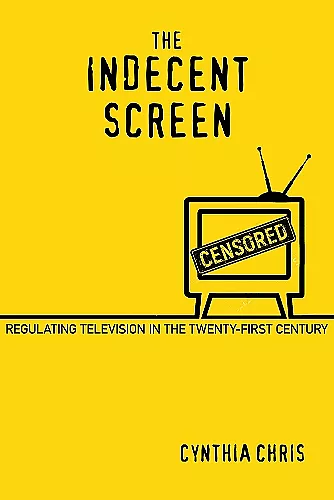The Indecent Screen
Regulating Television in the Twenty-First Century
Format:Paperback
Publisher:Rutgers University Press
Published:7th Jan '19
Currently unavailable, and unfortunately no date known when it will be back

The Indecent Screen explores clashes over indecency in broadcast television among U.S.-based media advocates, television professionals, the Federal Communications Commission, and TV audiences. Cynthia Chris focuses on the decency debates during an approximately twenty-year period since the Telecommunications Act of 1996, which in many ways restructured the media environment. Simultaneously, ever increasing channel capacity, new forms of distribution, and time-shifting (in the form of streaming and on-demand viewing options) radically changed how, when, and what we watch. But instead of these innovations quelling concerns that TV networks were too often transmitting indecent material that was accessible to children, complaints about indecency skyrocketed soon after the turn of the century. Chris demonstrates that these clashes are significant battles over the role of family, the role of government, and the value of free speech in our lives, arguing that an uncensored media is so imperative to the public good that we can, and must, endure the occasional indecent screen.
"The Indecent Screen may represent the literal 'bookend' on the history of broadcasting in relation to questions of choice in the market, public service and the airwaves, and decency. It could not be more timely and engaged with present debates." — Victoria E. Johnson, author of Heartland TV: Prime Time Television and the Struggle for U.S. Identity
"The Indecent Screen is an incisive look at the limits and limitations of contemporary media policy."— Jennifer Holt, author of Empires of Entertainment: Media Industries and the Politics of Deregulation, 1980-1996
"Instead of...innovations quelling concerns that TV networks were too often transmitting indecent material that was accessible to children, complaints about indecency skyrocketed soon after the turn of the century. Chris demonstrates that these clashes are significant battles over the role of family, the role of government, and the value of free speech in our lives, arguing that an uncensored media is so imperative to the public good that we can, and must, endure the occasional indecent screen."— Concurring Opinions
"Recommended."— Choice
"Mass Communication and media law scholars will find this text most helpful." — Communications Booknotes Quarterly
"The Indecent Screen is a unique and necessary contribution to the field of censorship studies, and like broadcast television itself, justifies its place with enthralling detail and a powerful, complex history."— Journal of Digital Media & Policy
"Instead of...innovations quelling concerns that TV networks were too often transmitting indecent material that was accessible to children, complaints about indecency skyrocketed soon after the turn of the century. Chris demonstrates that these clashes are significant battles over the role of family, the role of government, and the value of free speech in our lives, arguing that an uncensored media is so imperative to the public good that we can, and must, endure the occasional indecent screen."— Concurring Opinions
"The Indecent Screen is a unique and necessary contribution to the field of censorship studies, and like broadcast television itself, justifies its place with enthralling detail and a powerful, complex history."— Journal of Digital Media & Policy
"The Indecent Screen may represent the literal 'bookend' on the history of broadcasting in relation to questions of choice in the market, public service and the airwaves, and decency. It could not be more timely and engaged with present debates." — Victoria E. Johnson, author of Heartland TV: Prime Time Television and the Struggle for U.S. Identity
"The Indecent Screen is an incisive look at the limits and limitations of contemporary media policy."— Jennifer Holt, author of Empires of Entertainment: Media Industries and the Politics of Deregulation, 1980-1996
"Recommended."— Choice
"Mass Communication and media law scholars will find this text most helpful." — Communications Booknotes Quarterly
ISBN: 9780813594064
Dimensions: 229mm x 152mm x 15mm
Weight: 340g
254 pages